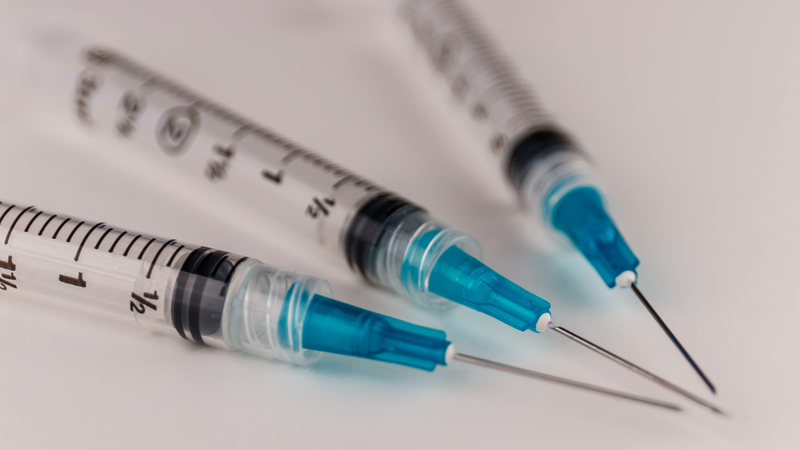Terrified of Needles? That Can Affect Your Health
How this fear affects health and what can be done

Dr. Robert H. Shmerling of the Harvard Health Blog describes how being terrified of needles – trypanophobia – can affect a person’s health and what they can do to overcome that fear.
No one likes getting stuck by a needle. Whether for a blood test, vaccination, or blood donation, needle sticks are something most people would prefer to avoid.
Yet, judging only by schedules for routine vaccinations and tests, the average healthy person can expect at least 165 needle sticks over a lifetime. Get hospitalized? That might add dozens or even hundreds more. And the number of needle sticks experienced by people with diabetes, HIV, and some other illnesses hovers in the “don’t ask” range.
For many, being terrified of needles may be more of an annoyance than a real problem. But if you have a strong fear of needles or aversion to the sight of blood, getting a vaccination or any other needle stick is a big deal. If this sounds like you, you may have trypanophobia.
What is trypanophobia?
Fittingly, the name combines the Greek term trypano – meaning puncturing or piercing – with phobia, meaning fear. This remarkably common condition is marked by irrational, extreme fear or aversion to blood or needles. It’s estimated that fear of needles affects up to 25% of adults, and it may lead 16% of people in the U.S. to skip vaccinations. Many people who are terrified of needles may avoid doctors and medical care, so it’s likely that the magnitude of this problem is underestimated.
Just to be clear: this phobia is not limited to people who are overly sensitive to pain or aren’t “tough enough.” It can affect anyone. The cause is often unknown, but a particularly traumatic experience during childhood medical illness may set the stage for some people. And there may be a genetic component. Researchers have found genes linked to fainting after needle sticks, and trypanophobia sometimes runs in families.
What are the symptoms of this phobia?
People with trypanophobia who are contemplating a needle stick may experience:
- Fear or anxiety
- Panic attacks, nausea, or sweats
- Palpitations
- Fainting (due to a reflex in which pain or the sight of blood triggers a drop in blood pressure)
- Insomnia in the days or weeks before an expected needle stick.
How does being afraid of needles affect a person?
This fear can affect your:
- Quality of life: It’s quite unpleasant to spend weeks dreading an upcoming doctor’s appointment.
- Health: Skipping recommended tests and treatment to avoid needle sticks can lead to missed diagnoses, poorly monitored medical conditions, and undertreatment. A timely example is foregoing a vaccination against COVID-19, which can have serious or even deadly consequences. Also, drug marketers sometimes play on fear of needles in their advertising, or might downplay the fact that a medication requires an injection.
- Longevity: Skipping routine medical care can contribute to avoidable suffering and death. For example, a cancerous breast lump that might have been detected during routine examination may go unnoticed until much later, when it’s no longer curable.
What can I do to cope with a fear of needles?
There’s not much high-quality research regarding how best to treat trypanophobia. Still, experts suggest a number of options to help people cope with it.
- Bring support, if allowed. That’s routine for small children. But holding the hand or hearing the voice of a spouse, trusted friend, or family member can calm adults, too.
- Harness the power of distraction. Focus on anything other than the needle stick: a spot on the floor, the positive effects of getting a COVID-19 vaccine (soon you can hug your family!), or your upcoming vacation.
- Tell the person giving you a shot or drawing blood that you struggle with this, and let them know what works best for you. Some people prefer to hear about each step before it happens so there are no surprises. Ask if the healthcare provider has tricks of the trade to help you get through it.
- Ask the person giving your shot or drawing blood if they can use a numbing agent similar to novocaine, or a freezing spray to numb skin before a needle stick.
- Don’t watch! It’s not helpful to watch all of the preparation for the needle stick or see the needle itself. Watching may make things worse.
- Learn ways to relax. Try deep breathing or other relaxation techniques that you can practice before having the needle stick.
- Relax the muscle receiving the injection, too. Some shots, such as vaccines that protect you against tetanus or COVID-19, are given in a muscle. Relaxing the muscle can lessen the pain of these shots.
- Lie down before having the needle stick, if you’ve fainted or felt woozy in the past with needle sticks.
Can therapy help?
Seeing a mental health specialist may be helpful for those who are terrified of needles. He or she may recommend:
- Cognitive behavioral therapy, or CBT, which teaches people ways to reframe unhelpful ways of thinking and build coping strategies.
- Exposure therapy, a gradual and supervised increase in your exposure to needles, which can lessen the panic they cause. For example, over a number of weeks you may be instructed to look at photographs of needles, then hold a syringe without a needle, then hold a syringe with a needle, and then imagine injection – all with guidance from a therapist – before actually having one.
- Medications, such as anti-anxiety or sedative medications, may be prescribed if other measures aren’t effective, and the anxiety around needle sticks is getting in the way of medical care (or just making you miserable).
Experienced professionals with Internal Medicine Jobs will help you choose the right approach for you.
The bottom line
It’s natural to have an aversion to pain, even when you know it’s coming and even though it’s for a good reason. So, if you’re one of the millions fretting about getting a COVID-19 vaccine or a blood test or any other needle stick, know that you’re not alone, and that there are things you can do to improve the situation. Talk to your doctor about your fear and get help if you need it. Your quality of life, health, and longevity could depend on it.
As for me, I’m going to do what I always do: avert my eyes and stare at that spot on the floor.
Robert H. Shmerling, M.D., is a senior faculty editor at Harvard Health Publishing.
© 2021 Harvard University. For terms of use, please see https://www.health.harvard.edu/terms-of-use. Distributed by Tribune Content Agency, LLC.


